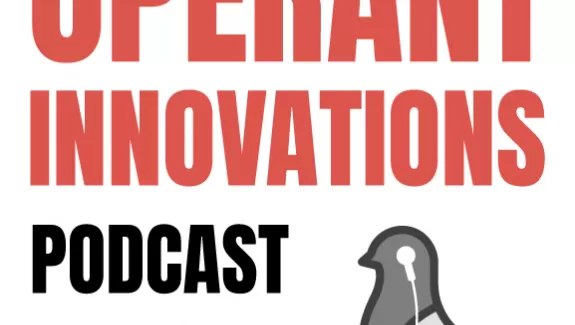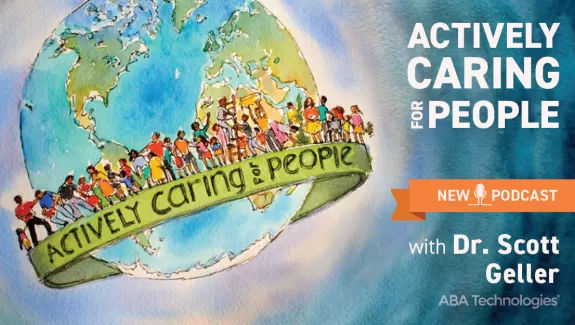Operant Innovations 020 | What Can You Do with Your Degree OTHER than Clinical Work? | Shauna V. Costello
We see this question A LOT! "What can I do with a degree in behavior analysis other than clinical work?" The answer is simple - A LOT! The process to get there can be unknown and uncertain though. Today we are talking about some related fields and how to get into them.
Additional Resources:
Lean & Six Sigma - No single certifying body
Supply Chain Management - APICS.org & Instituteforsupplymanagement.org
Behavior-Based Safety - No certifying body
Human Resources - HRCI.org & SHRM.org
Contact Information
shauna@abatechnologies.com
operantinnovations@abatechnologies.com
TRANSCRIPT
Shauna Costello (00:02):
You're listening to Operant Innovations. A podcast brought to you by ABA Technologies. You're used to hearing my voice, but I typically try to get outside folks to come in and present for you. Instead today, I figured I would talk a little bit about professional development and behavior analysis. Because of my job, I often get asked to come and speak to students groups regarding what they can do with their degree in behavior analysis, outside of work in a clinical setting and I can relate very well. After graduating from Western Michigan University, I worked in a clinical setting in Metro Detroit, where I worked my way up from a BCBA to the ABA coordinator position. After about three years, I found myself getting very burnt out and I probably should have seen this coming because I never really saw myself staying in a clinical setting. So I made a very drastic decision and left the clinical world and decided that it was time to look for something else. But I had no idea where to look. I had no idea what I was qualified for, and I had no idea what I was going to do. While I was taking some time to apply for jobs that were not related to the field of behavior analysis, I worked as an independent contractor making my own schedule. So I was open to take interviews. And after about six months, I finally got a job listing from ABA Technologies as a professional development specialist.
I had no idea what that was at the time, but it has turned into one of the best jobs I have ever had. But why are we talking about this today? So not only do I get a lot of questions from students that I supervise and students in their cohorts, but I also scour social media and see questions regarding what can I do with my degree in behavior analysis that's not clinical and how do you get these jobs? And so I want to dive a little bit deeper into what is professional development. So professional development is the continued training and education of an individual in regards to their career. And this is a pretty broad definition. And I want to clarify this. It doesn't matter if you are already graduated with your bachelor's degree, Master's degree or PhD, or if you are still in your university training program. You can be working on your professional development. The way to get started with this is really asking yourself and exploring which fields you are interested in working in, and then diving even deeper. So some related fields that you may be interested in can include sustainability, public policy, instructional design, e-learning, business. And those might not seem related to behavior analysis, but as we know, human behavior is encompassed within all of those fields.
And so one that I get a lot of questions about specifically is business. And in business, there are a lot of sub-fields. There's organizational behavior management or OBM, project management, lean and six Sigma, supply chain management, business analysis, behavior-based safety, performance management, and human resources. And that spreads across the entire array of what you could be doing in a business setting. But I want to go into a little bit more detail about how you can gain this professional development in these related fields. While you are in your university training, it might be a little bit easier for you to get some of these additional resources and training because as a student, that gives you the option to reach out to your university, even outside of the program that you're in to gain additional coursework training, or just trainings in general from your university. So if you're a current student, please check with your university to see what other kinds of programs they have for you to sit in on. Another way you can do this, whether or not you're in a university training program or done with your degree altogether is you can look at online trainings and certifications. And I'm going to go a little bit more into depth in that in just a minute, but that is one of the best ways that you can go about finding these additional trainings in the areas that you were interested in.
Another way to do this is by looking into paid internships and getting that mentorship for the fields that you are interested in. And I know that this one isn't always a preferred method, but this is something that I talked to my students about a lot, just because you have a Master's degree and you're graduating with a Master's degree, does not necessarily mean you are a hundred percent ready to go straight into your dream job and the best way to get into a company and to not only be a feeder into a potential full-time position, but it's also a good way to test out the company from your side. A paid internship isn't just about the company testing you out to see if you would fit in a full-time position. It's also a way for you to test out working for that company to ensure that that is where you want to be in the field that you want to be in.
And often these don't take up too much of your time. It could be a couple months at a time, and then you can decide if you want to stay in that field of study or move on to something different. And so to gain a little bit more perspective on these related fields and where you can get some of these trainings, I'm going to stick more specifically to business because business is typically where I see a lot of behavior analysts going and with the training that you have in human behavior, it's a very good fit in a very easy way to adjust your resume, your CV, to be related to these fields. So one of the biggest questions that I see is related to organizational behavior management. Individuals have degrees in behavior analysis, and they're looking for a job in organizational behavior management, but they don't know where to start.
And I want to start off by saying that it's very rare for someone to find a job title that has organizational behavior management in the job title, or even the description. You're going to have to look in depth at every single job posting that you're interested in to see if your skills in training fit within that job role. But for some additional training in organizational behavior management, you can go to OBM network and you can also take some online training. One training, and I want to give a caveat here that this is an ABA Technologies program, the OBM specialist certificate. After completing the OBM specialist certificate, students will be able to better identify a business opportunity in their workplace, define an OBM project that targets the opportunity, gather project team and gain ongoing organizational support for the project and navigate the project to completion by following the space model, which has scope, pinpoint, assess, change, and embed.
The space model may be compared to six Sigma's DMAIC as it provides individuals in their project teams with a shared framework set of tools, process, and language to help project teams navigate the application of an OBM project to completion in a way that is understood and supported by organizational stakeholders. To build on that even more ABA Technologies is taking the feedback from their current students and developing additional courses on top of the OBM specialist that will then be able to get you more mentorship and direct feedback on projects you're working on. Another professional development opportunity within business that is huge is project management. All information for project management can be found at pmi.org. There are many different certification levels within project management. So you'll want to do some research. And if you're interested, find out which one of those certification levels is right for you, which one is going to push your career further and then make sure you're going through the accredited program to get your certification for project management.
Another one that's really popular is lean and six Sigma. And as of right now, there is no single certifying body. And that is something that could very easily change in the near future. So if you're interested in lean and six Sigma, please just make sure that you are staying up to date on that. Really do your research and find a program and a program and a test that are really going to be all encompassing. Another area of business that's very closely related to behavior analysis is supply chain management and a couple websites for this include APICS.org, and the instituteforsupplymanagement.org. These are two of the best resources that you're going to have for research in supply chain management, figuring out what training you're going to need, figuring out if there's any additional certifications that you're going to need related to supply chain management and where you could go with it.
Another area of business is business analysis. And for business analysis, you're going to want to go to IIBA.org, to get more information regarding what you can do, what training you can do and where you can go with the certification. For behavior based safety, there's not currently a certifying body for this and these skills that have to do with behavior based safety are typically within the job description and within the job role that you're going to have within the company. But as of right now, there are no extra credentials that I know of for you to be able to get more training in behavior based safety outside of mentorship and internships, and your university training as well. Performance management is another area of business. And for this one, I really recommend the six boxes training from Carl Binder. And you can find that at sixboxes.com.
And then one thing that I've realized from working with students is that some of them are actually really interested in training. And so that's going to fall more within the human resources department. There are a couple different credentialing bodies for human resources, and one is HRCI. And another one is SHRM. These are some of the big umbrella areas of business. If you're interested in and you want to learn more about them, I have included links to all of these organizations that I mentioned in the podcast description. And of course, if you have more questions, please feel free to reach out to me. Again, I just want to reiterate that unfortunately, no one is going to have one solid answer for you. If you are looking to get out of clinical behavior analysis and you want to get into some related fields with business or sustainability, public policy, instructional design, one of the biggest things that you're going to have to do is you're going to have to do your own research.
You're going to have to dive deep into that field of study that you are interested in and make sure that you are finding the websites that are applicable, any credentials and training that is required to get additional certifications. Because if you want to go onto some of these extra fields, extra certifications are required. Unfortunately, the BCBA credential is not often recognized outside of clinical behavior analysis unless you're working in an OBM setting for a clinical company. And so there are many other certifications out there that can help you get to a job where you want to get to, but it's going to take some extra time, extra training and getting that mentorship and even potentially getting into a paid internship position to get additional experiences within that company to help build your resume and your CV. And so, like I said before, this is a question that I see, and I get from students a lot.
I would love to develop more training regarding resumes, research, how to do this, how to figure out where you want to go next, how to get mentorship, how to get training. And so if you're interested, you can always reach out to me. My email is shauna@abatechnologies.com. So thank you for listening today. And I have included my email and all of the related websites that I talked about today in the podcast description. And of course, if you ever need anything, you can reach out to me specifically, or you can always reach out to operantinnovations@atabatechnologies.com.



Leave a reply